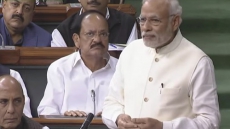The passing away of Sushma Swaraj marks the end of the political journey of yet another leader of the party from Delhi - proteges of veteran L K Advani - who rose to prominence in the BJP after he emerged as the party's main face after 2004.
Former finance minister Arun Jaitley has been keeping out of day-to-day politics for health reasons and M Venkaiah Naidu is no longer in active politics since being appointed Vice President.
Ananth Kumar, another of the quartet, passed away in November last year, and with Sushma Swaraj's death on Tuesday, an era has ended.
The leaders were called "Delhi-4" or "D4" by some in the party as they were mostly based in the national capital and virtually ran the show in the organisation due to their proximity to LK Advani, the BJP patriarch.
They were at the centre of the planning and strategising for the 2009 general elections when Mr Advani was the prime ministerial candidate, and despite the electoral drubbing, the group of four continued to wield power with Sushma Swaraj becoming the leader of the opposition in Lok Sabha and Arun Jaitley her counterpart in Rajya Sabha.
The Congress-led United Progressive Alliance retained power in 2009, following which the Rashtriya Swayamsevak Sangh (RSS) - the ideological mentor of BJP - decided to look beyond the ageing Mr Advani and his protegees.
The RSS played a key role in making Nitin Gadkari the new BJP chief. He hailed from Nagpur, where the Sangh is headquartered, and was a complete outsider to the national politics.
Though Sushma Swaraj and Arun Jaitley became the voice of the party in parliament, the Sangh appeared to curtail their clout with Mr Gadkari at the helm. As the party's leader in Lok Sabha, Sushma Swaraj was seen by many as successor of LK Advani and the party's face in the 2014 general election.
The so called D-4, however, began to lose its grip as the Advani era faded and the then Gujarat chief minister Narendra Modi emerged on the national scene which later led to his selection as the BJP's prime ministerial candidate for the 2014 polls.
After Amit Shah's appointment as the BJP president, the centre of power within the party shifted dramatically but the four leaders remained in the party's parliamentary board, its top decision making body.
All leaders were given cabinet berths in the first Modi government, with Arun Jaitley and Sushma Swaraj being allotted key portfolios of finance and external affairs respectively.


